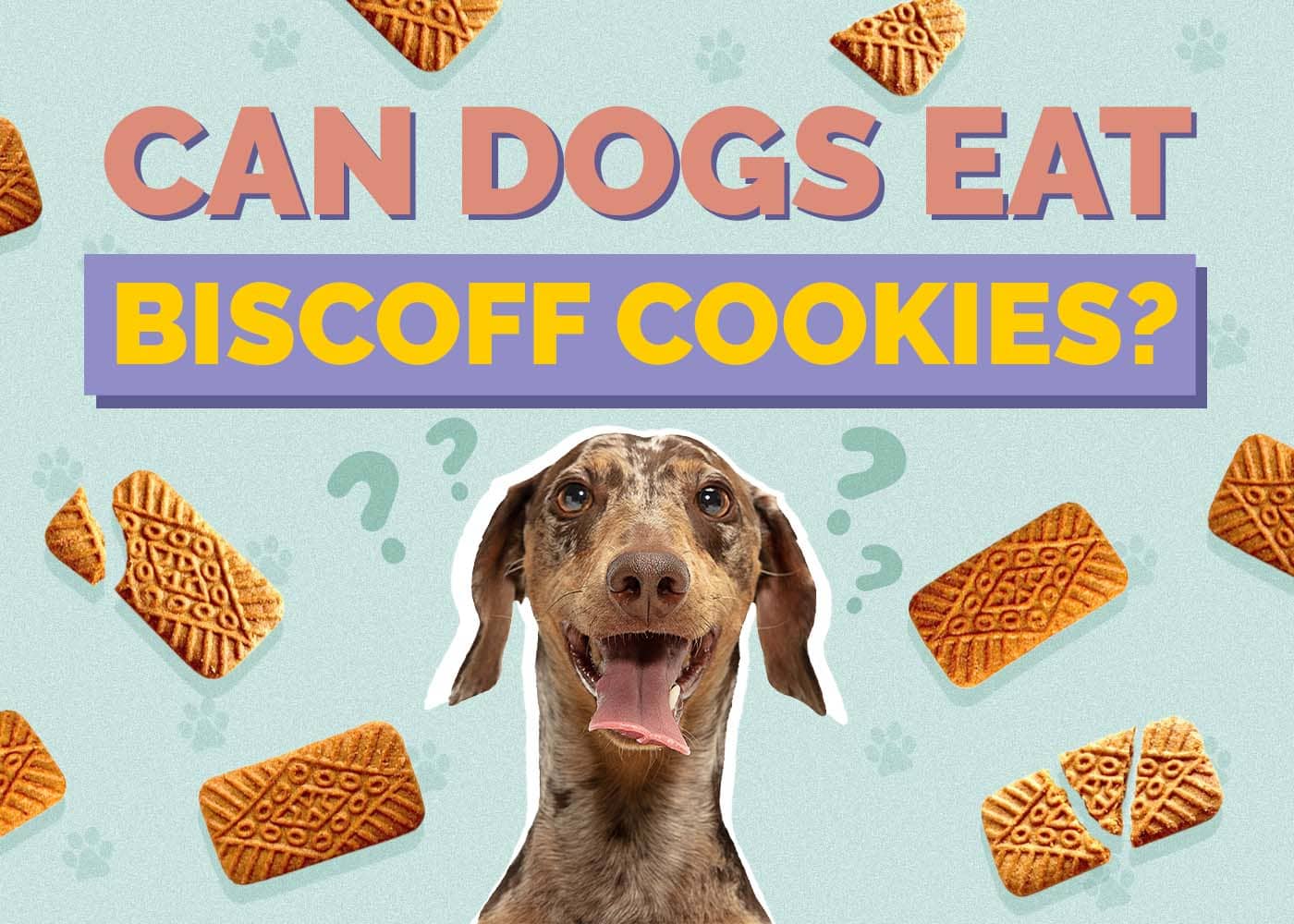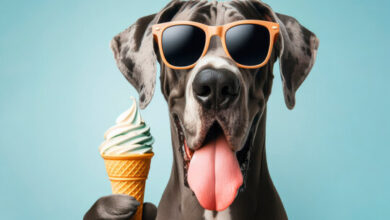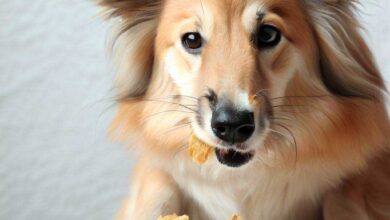Can Dogs Eat Biscoff Cookies? What You Need to Know-2024

Can Dogs Eat Biscoff Cookies? If you’re a dog owner and love Biscoff cookies, you might wonder if it’s okay to share these sweet treats with your pet. Biscoff cookies are made with key ingredients like wheat flour, sugar, and vegetable oils, spiced with cinnamon and other flavorings. They often contain additives like emulsifiers and preservatives to keep them fresh.
While Biscoff cookies aren’t toxic to dogs, they aren’t the healthiest choice for them. The high sugar, fat, and additives can upset your dog’s stomach and lead to health issues if consumed in large amounts. In this article, we’ll take a closer look at why it’s best to avoid feeding your dog Biscoff cookies and explore safer alternatives. So, let’s briefly discuss that- Can Dogs Eat Biscoff Cookies?
Are Biscoff Cookies Safe for Dogs to Eat?
Can dogs eat Biscoff cookies? While they may seem harmless, these sweet treats aren’t ideal for dogs. Even though Biscoff cookies don’t contain toxic ingredients like chocolate, the high sugar, fat, and wheat content can harm your dog’s health if consumed regularly.
1. High Sugar Content
- Contributes to obesity: Biscoff cookies are packed with sugar, which can lead to weight gain and obesity in dogs.
- Risk of diabetes: Too much sugar can also increase the risk of diabetes, a condition that affects your dog’s energy levels and overall health.
- Dental problems: Sugar promotes tooth decay, leading to cavities and gum disease.
2. Excessive Fat Content
- Causes digestive upset: High-fat treats can lead to diarrhea, vomiting, and stomach discomfort.
- Pancreatitis risk: Eating fatty foods like Biscoff cookies can trigger pancreatitis, a painful inflammation of the pancreas that may require veterinary care.
- Long-term impact: Regular consumption of fatty foods puts a strain on your dog’s digestive system.
3. Contains Wheat (A Common Allergen)
- Gluten intolerance: Some dogs are sensitive to gluten, a protein found in wheat, leading to itchy skin, ear infections, and digestive issues.
- Allergic reactions: Symptoms of wheat allergy include excessive scratching, hot spots, paw licking, and gastrointestinal upset.
- Limited nutritional value: Wheat in Biscoff cookies provides no essential nutrients for dogs and can be replaced with healthier grains.
Additional Risks of Feeding Biscoff Cookies to Dogs
- Artificial additives: Biscoff cookies contain preservatives, emulsifiers, and other additives that can upset your dog’s stomach.
- Cinnamon in large amounts: While small amounts of cinnamon aren’t toxic, excessive consumption can cause irritation or digestive problems in dogs.
- Empty calories: These cookies offer little nutritional value and can lead to unnecessary calorie intake, which is especially harmful to less active or senior dogs.
What Happens If Your Dog Eats Biscoff Cookies?
If your dog sneaks a Biscoff cookie:
- Observe symptoms: Watch for signs like vomiting, diarrhea, or lethargy.
- Offer water: Provide plenty of fresh water to help with digestion.
- Contact your vet: If symptoms persist or your dog ate a large amount, call your vet for advice.
Can Dogs Eat Biscoff Cookies?
Can Dogs Eat Biscoff Cookies? While a small nibble of Biscoff cookies may not harm your dog immediately, they are not a healthy or suitable treat. The high sugar, fat, and wheat content can negatively impact their health over time. Stick to healthier alternatives like dog-safe biscuits, fresh fruits, or vegetables to keep your furry friend happy and healthy.
Health Risks of Feeding Biscoff Cookies to Dogs
Can Dogs Eat Biscoff Cookies? Biscoff cookies might be a delicious treat for humans, but they can pose serious health risks to your dog. These cookies are high in sugar, fat, and calories, which can negatively affect your dog’s health. Let’s take a closer look at the potential risks.
1. Digestive Issues
Feeding Biscoff cookies to your dog can upset their stomach.
- Common symptoms: Vomiting, diarrhea, and bloating.
- Why it happens: The high sugar and fat content in Biscoff cookies can irritate your dog’s digestive system, causing discomfort.
2. Obesity
Biscoff cookies are calorie-dense, which can contribute to unhealthy weight gain.
- Increased risk: Obesity can lead to joint problems, decreased mobility, and a shorter lifespan.
- Hidden danger: Even a small cookie can add unnecessary calories, especially for smaller or less active dogs.
3. Pancreatitis
The high fat content in Biscoff cookies can trigger pancreatitis, a serious condition.
- What is pancreatitis? It’s an inflammation of the pancreas that can cause severe abdominal pain and vomiting.
- Symptoms to watch for: Loss of appetite, lethargy, and a hunched posture.
- Veterinary care: Pancreatitis often requires immediate medical attention, so it’s best to avoid feeding fatty treats like Biscoff cookies.
Can dogs eat Biscoff cookies? While one small bite might not cause harm, the long-term health risks outweigh any momentary treat. Stick to healthier options like dog-friendly snacks to keep your furry friend safe and healthy.
What Happens If Your Dog Eats Biscoff Cookies?
Can Dogs Eat Biscoff Cookies? Biscoff cookies might seem harmless, but they contain ingredients that can upset your dog’s stomach. Whether your dog snuck a single cookie or devoured an entire package, it’s important to understand what might happen and how to respond.
1. Small Amounts: Minimal Risk but Watch for Signs
If your dog eats a small portion of Biscoff cookies, the effects may be mild, but it’s still worth keeping an eye on them.
Possible Symptoms:
- Mild gas or soft stool
- Slight increase in thirst
- Why It Happens: The sugar, fat, and spices in Biscoff cookies can be hard for dogs to digest, even in small amounts.
2. Larger Quantities: Potential for Serious Issues
If your dog consumes multiple cookies or a large quantity, you may see more severe reactions.
Common Symptoms:
- Vomiting or diarrhea
- Lethargy or decreased activity
- Bloating and abdominal discomfort
Health Risks:
- Pancreatitis: The high fat content can inflame the pancreas, causing severe pain, vomiting, and loss of appetite.
- Obesity: Repeated consumption of sugary, high-calorie treats can contribute to unhealthy weight gain over time.
3. Immediate Steps to Take
If you notice your dog has eaten Biscoff cookies, here’s what you can do:
- Monitor for Symptoms: Keep an eye on their behavior and bathroom habits for the next 24 hours.
- Provide Water: Encourage your dog to drink water to help flush out the sugar and fat from their system.
- Avoid Additional Treats: Stick to their regular diet to prevent further digestive upset.
4. When to Call the Vet
It’s best to contact your veterinarian if your dog:
- Vomits multiple times or has persistent diarrhea.
- Appears extremely lethargic or shows no interest in food or water.
- Displays signs of pain like whining, pacing, or reluctance to move.
- Early intervention can prevent complications and ensure your dog recovers quickly.
5. Preventing Future Incidents
To avoid accidents in the future:
- Store Cookies Safely: Keep Biscoff cookies and other human treats out of your dog’s reach.
- Train Basic Commands: Teach commands like “leave it” or “stay” to prevent them from grabbing food off the table.
- Stick to Dog-Safe Treats: Offer healthy alternatives like plain dog biscuits, carrots, or apple slices instead of sugary snacks.
Remember, while Biscoff cookies aren’t toxic, they’re not a safe or healthy treat for dogs. It’s always better to stick with foods that are specifically made for canine consumption.
Dog-Friendly Alternatives to Biscoff Cookies
Can Dogs Eat Biscoff Cookies? If your dog has a sweet tooth, you don’t have to resort to sugary snacks like Biscoff cookies. There are plenty of healthier, dog-friendly alternatives that can satisfy their cravings without putting their health at risk. Here are some safe options:
1. Plain, Unsweetened Dog Biscuits
A classic and safe treat for dogs.
Benefits:
- Low in sugar and fat.
- Designed to support canine digestion and dental health.
- Tip: Look for biscuits with simple, natural ingredients and no artificial flavors or additives.
2. Fresh Fruits
Fruits can make a refreshing, nutritious treat for your dog, but always serve them in moderation.
Safe Options:
- Apple Slices (remove seeds and core)
- Strawberries (cut into small pieces)
- Blueberries
Benefits:
- Rich in vitamins and antioxidants.
- Low in calories compared to sugar cookies.
- Caution: Avoid grapes, raisins, and cherries, which are toxic to dogs.
3. Homemade Dog Treats
Making treats at home allows you to control the ingredients and ensure they’re safe for your pup.
Popular Recipes:
- Pumpkin Dog Treats: Mix canned pumpkin (plain, no spices), oat flour, and a little water to form dough. Bake for a crunchy snack.
- Peanut Butter Biscuits: Use unsalted, unsweetened peanut butter with whole wheat flour and eggs for a tasty, protein-packed treat.
Benefits:
- Free from preservatives and artificial ingredients.
- Customizable to suit your dog’s taste and dietary needs.
4. Vegetable Treats
Crunchy vegetables are a low-calorie alternative to Biscoff cookies.
Safe Choices:
- Carrot Sticks
- Cucumber Slices
- Green Beans
Benefits:
- High in fiber, which aids digestion.
- Provides hydration and essential nutrients.
Why Choose Dog-Friendly Alternatives?
Feeding your dog healthy treats helps:
- Maintain a healthy weight.
- Reduce the risk of digestive issues.
- Promote better overall health and longer life.
Next time your dog begs for a cookie, try one of these healthier options instead!
Tips for Keeping Your Dog Away from Human Treats
Can Dogs Eat Biscoff Cookies? It’s natural for dogs to be curious about the delicious smells of human treats like Biscoff cookies, but those snacks aren’t always safe for them. Here are some practical tips to keep your dog away from human treats and ensure they stay healthy:
1. Store Cookies and Sweets Securely
Dogs are great at sniffing out snacks, so make sure treats are out of reach.
- Use Sealed Containers: Keep cookies, candies, and other sweets in airtight containers.
- Store on High Shelves: Place these containers in cabinets or on shelves that your dog can’t access.
- Avoid Leaving Snacks Out: Never leave human treats unattended on counters or tables.
2. Teach Important Commands
Training your dog to follow commands can prevent them from grabbing harmful snacks.
- “Leave It”: Teach your dog to ignore items they find interesting but shouldn’t eat.
- “No”: Use a firm “no” to stop your dog if they’re about to eat something unsafe.
- Practice Regularly: Reinforce these commands with positive reinforcement to ensure they remember them.
3. Offer Dog-Safe Snacks
Sometimes, dogs beg for treats simply because they’re hungry or bored.
- Keep Dog-Friendly Treats Handy: Offer healthy options like dog biscuits, carrots, or apple slices.
- Rotate Treats: Providing variety helps keep your dog interested in their own snacks rather than yours.
- Reward Good Behavior: Give your dog a treat when they successfully avoid human food to encourage good habits.
4. Supervise During Meal Times
Dogs often try to sneak food while you eat.
- Keep Them in Another Room: If possible, have your dog stay in a different room during meals.
- Use a Baby Gate: Block off the dining area to prevent your dog from accessing food.
Why It Matters
Keeping your dog away from human treats like Biscoff cookies helps:
- Prevent digestive issues and weight gain.
- Avoid accidental poisoning from harmful ingredients.
- Ensure they develop healthy eating habits.
Can Dogs Eat Biscoff Cookies? By taking these simple steps, you can protect your dog and keep them happy with safe, dog-friendly snacks!



